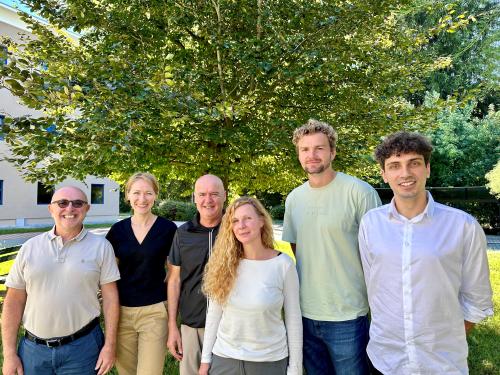Brief me
Social Multi-Criteria Evaluation (SMCE) is a well-established methodological framework for comparing public policy alternatives. It integrates multiple technical impact dimensions and social perspectives, ensuring a comprehensive assessment of policy choices.
To further advance SMCE, the Decision Analysis Lab at the Joint Research Centre conducts both methodological and applied research, developing scientific publications, technical reports, guidelines, and tools.
SOCRATES, our specialized software tool, supports impact assessment by structuring problems, increasing transparency in weighting relations, and enabling sensitivity and robustness analyses.
We also support the implementation of SMCE across various policy areas, including health, energy, and the environment. Within the European Commission, we contribute to ex ante impact assessments, helping to identify the best policy options in a structured, inclusive, and transparent manner.
Why use Social Multi-Criteria Evaluation
SMCE is a methodological framework for developing and comparing policy alternatives in a consistent and transparent way, allowing for the integration of a plurality of technical impact dimensions and social perspectives. SMCE is based on the multi-criteria decision analysis (MCDA), which is the most widespread multidimensional modelling approach to decision problems. The basic idea is that one has first to establish objectives, i.e. the direction of the desired changes (e.g. maximize profits, minimize environmental impact, minimize social exclusion, etc.) and then find useful practical criteria which indicate the consistency between an option and a given objective.
Social Multi-Criteria Evaluation (SMCE) is specifically designed for public policy, serving as a highly effective methodological and operational framework for ex ante impact assessment of policy options. Its basic methodological foundation is incommensurability, i.e. the notion that in comparing options, a plurality of technical dimensions and social perspectives is needed.
SMCE has demonstrated its usefulness for policy assessment and conflict management in many real-world problems in various geographical and cultural contexts. SMCE can provide a methodology that is:
- inter/multi-disciplinary, since the various criterion scores can assess a wide range of impacts, for example, by using results of economic, environmental, energy, and other simulation models;
- participatory, allowing to take a plurality of social values, perspectives and interests into account;
- transparent, since all criteria are presented in their original form without any transformations in money, energy or whatever common measurement rod.
In the framework of SMCE, mathematical aggregation and ranking rules guarantee consistency between assumptions used and results obtained. The importance of mathematical approaches in SMCE is their ability to allow a consistent aggregation of the diverse information. Otherwise, the standard objection might be that the aggregation of apples and oranges is impossible. Multi-criteria mathematics does answer to this objection in a definitive way.
Operational implementation
From an operational point of view, the support of a software tool makes all required computations very quick. The Decision Analysis Lab at the Joint Research Centre has developed such software tool, called SOCRATES (SOcial multi-CRiteria AssessmenT of European policieS).
SCME and SOCRATES have been applied in a set of impact assessments of the European Commission. Of these, the following have been published so far:
- IMPACT ASSESSMENT REPORT Accompanying the document Proposal for a Regulation of the European Parliament and of the Council on standards of quality and safety for substances of human origin intended for human application and repealing Directives 2002/98/EC and 2004/23/EC, EUR-Lex - SWD:2022:190:FIN - EN - EUR-Lex (europa.eu)
- IMPACT ASSESSMENT REPORT Accompanying the document COMMISSION REGULATION (EU) …/… implementing Directive 2009/125/EC of the European Parliament and of the Council as regards ecodesign requirements for local space heaters and separate related controls and repealing Regulation (EU) 2015/1188, Register of Commission Documents - SWD(2024)62 (europa.eu)
The United Nation International Atomic Energy Agency has also decided to use SMCE and the SOCRATES software in its activities of decommissioning and environmental remediation, in the framework of the MAESTRI project (Management Systems Supporting Environmental Remediation Projects) developed in the scope of the Environet (Network on Environmental Remediation and NORM Management).
Team activities
The activities of the Decision Analysis Lab include:
- methodological research resulting in scientific publications, technical reports and guidelines;
- applied research for the development of software tools, such as SOCRATES;
- support to the policy departments of the European Commission, known as Directorates-General responsible for different policy areas, and international organizations, such as the United Nations International Atomic Energy Agency;
- training courses on the use of social multi-criteria evaluation for public policy analyses.
The team collaborates with the main international scientific networks and academic institutions in the field, such as the European Working Group on Multi Criteria Decision Aid.

Latest knowledge from this Project
Sensitivity and Robustness Analyses in Social Multi-Criteria Evaluation of Public Policies
Multi-Criteria Decision Support for Small Modular Reactors
More information
| Coordinators | Giuseppe Munda |
| Participants | Ivano Azzini Nicole Ostlaender Egle Basyte Ferrari Richard Maydell Nicola Morandi |
| Originally Published | Last Updated | 06 Jun 2024 | 04 Feb 2025 |
| Related links | |
| Knowledge service | Metadata | Modelling |
| Digital Europa Thesaurus (DET) | Impact AssessmentBetter regulation |
Recommended reading
Driving decisions for nature and people: UNEP-WCMC’s 2023-2024 Impact Report
Uganda: Cost effective options for inclusive and sustainable development
Impact of technology transfer on food security in developing territories: a bibliometric analysis and systematic literature review
Share this page

